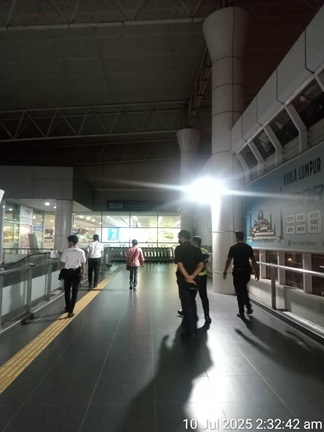
Pix courtesy of TBS FB
By Dr Rahim Said
If Dante were alive today, he might add a new circle to his Inferno: Terminal Bersepadu Selatan — the bureaucratic purgatory where some passengers purely go not to catch a bus, but occasionally weigh in on what’s travelling common sense.
For 23 years, Aeroline has ferried countless Malaysians and Singaporeans between KL and the Lion City in comfort and convenience — plush seats, Wi-Fi, a touch of class.
Now, thanks to our ever-efficient Land Public Transport Agency (APAD), the company will grind to a halt for a month starting November 6. Why? Because it stubbornly refused to bow before the altar of central planning and move its operations to TBS — the bureaucrats’ favourite monument to “integration” and inconvenience.
Let’s be fair. Anyone who has ever tried to “integrate” through TBS knows the experience: packed crowds, endless escalators, confused signage, and Grab fares that are not cheap.
For Singaporean tourists used to smooth transitions and punctual systems, welcome to the Malaysian Experience — where logic takes a back seat and red tape drives the bus.
Aeroline’s “crime” was daring to operate from sensible, accessible points — Corus KLCC, 1 Utama, and Sunway Pyramid — where real passengers actually live, shop, and commute.
But in the government’s infinite wisdom, that’s not “centralised” enough. Apparently, your comfort and convenience must now be routed through the Kafkaesque maze that is TBS, because some planner once drew a map that said “everything must go here.”
So, in one swift stroke, thousands of daily travellers — many of them cross-border commuters and families — are left high and dry.
Singaporeans, who already endure the Causeway crawl, must now add another obstacle to their Malaysian weekend — a trip to TBS, which might as well stand for Totally Bewildering Stop.
What’s truly impressive, however, is Aeroline’s restraint. Its official statement reads like a masterclass in passive-aggressive diplomacy.
“Please do not be angry with us… nor with the government,” it says sweetly — before subtly handing passengers APAD’s email addresses and suggesting they send their “humble appeals” directly. Translation: You know who to blame.
APAD, of course, insists that rules are rules. But one wonders if the same zeal applies to other transport fiascos — like the aerotrain that breaks down more often than it runs, or LRT leaks that give commuters unexpected showers.
No suspension there, just “investigations.”
Meanwhile, Aeroline promises to “reflect and innovate” during this suspension. Perhaps it’s already brainstorming slogans for its eventual return:
• “Aeroline: Back from Bureaucratic Exile.”
• “23 Years of Reliability, 1 Month of Government Reflection.”
• “Now Boarding from Anywhere but TBS.”
At the end of the day, this isn’t just about one company. It’s about how our obsession with “centralisation” often sabotages convenience, competitiveness, and common sense.
In the name of progress, we routinely punish what works — especially if it works too well without government supervision.
So come November 6, as passengers drag their luggage through the labyrinth of TBS, remember: this is what happens when bureaucracy confuses control with improvement.
So, if you happen to be one of those stranded Singaporeans? Welcome to Malaysia. We’re truly Asia — especially the red tape part.
The views expressed here are those of the author.
WE